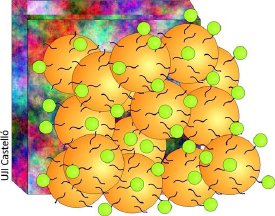Apr 20 2010
After responding to a call for proposals, the research group led by Juan Bisquert at Universitat Jaume I of Castelló has won the bid for a scientific and technological research project on new types of solar cells based on nanotechnologies. The project entitled "Células solares nanodiseñadas de bajo coste basadas en nanocristales semiconductores" ("Low cost nanodesigned solar cells based on semiconductor nanocrystals") will be funded with a 25 000 € grant from the Ministry of Science and Innovation for a period of three years.
The project is to be carried out as part of the Spanish National R&D Internationalisation Programme included within the Spanish Plan to Boost the Economy and Employment, Plan E. Its main aim is to further cooperation between Spain and Japan in the field of nanotechnologies and new materials for environmental challenges and sustainable development, as well as their application to improve energy efficiency in production, storage, transport or renewable energy conversion.
 Solar cells based on nanotechnologies.
Solar cells based on nanotechnologies.
Competition in this call for proposals was fierce, as a total of 61 proposals were submitted from the leading research centres in the field of nanotechnologies around the country. Altogether eight projects will be funded. Besides the UJI, the Technical University of Madrid, the University of Alicante, the University of Castilla La Mancha and several laboratories belonging to the Spanish Council for Scientific investigations will also carry out projects.
The project from the research group at the Universitat Jaume I will pay special attention to the fascinating scientific knowledge on new materials and nanocompounds which can contribute to photovoltaic conversion. The new solar cells, based on tiny components of materials called "quantum dots", are considered to be of particular interest. Quantum dots are units of semiconductors that are so small that they have a marked effect on the wave properties of matter, which means that the optical and electronic properties can be easily modified just by adjusting the size of particles. At present, luminescence of quantum dots is applied to make cell markers in biotechnology.
The project to be carried out at the UJI will investigate the application of nanocrystals for efficiently converting light into electricity, which requires integrating them within suitable structures so that solid durable devices can be produced. This is an essential condition in order to be able to transfer the results to industry. The development of the project is based on the research carried out by Iván Mora Seró, from the Bisquert group, in collaboration with a group led by Taro Toyoda in Japan. This collaborative research work has already given rise to a joint study on the properties of solar cells based on quantum dots, which was published in the prestigious journal Accounts of Chemical Research. Bisquert has also led the arrangements for the first international congress on the topic, which will take place in Jerusalem in February 2010.
According to Bisquert, if the UJI is to become a real centre of excellence, one of its priorities should be to hold onto high level young researchers, such as Iván Mora, who are capable of making the winning bids in calls for proposals for R&D projects, publishing in high impact journals and developing patents that can be exploited, based on new scientific discoveries.